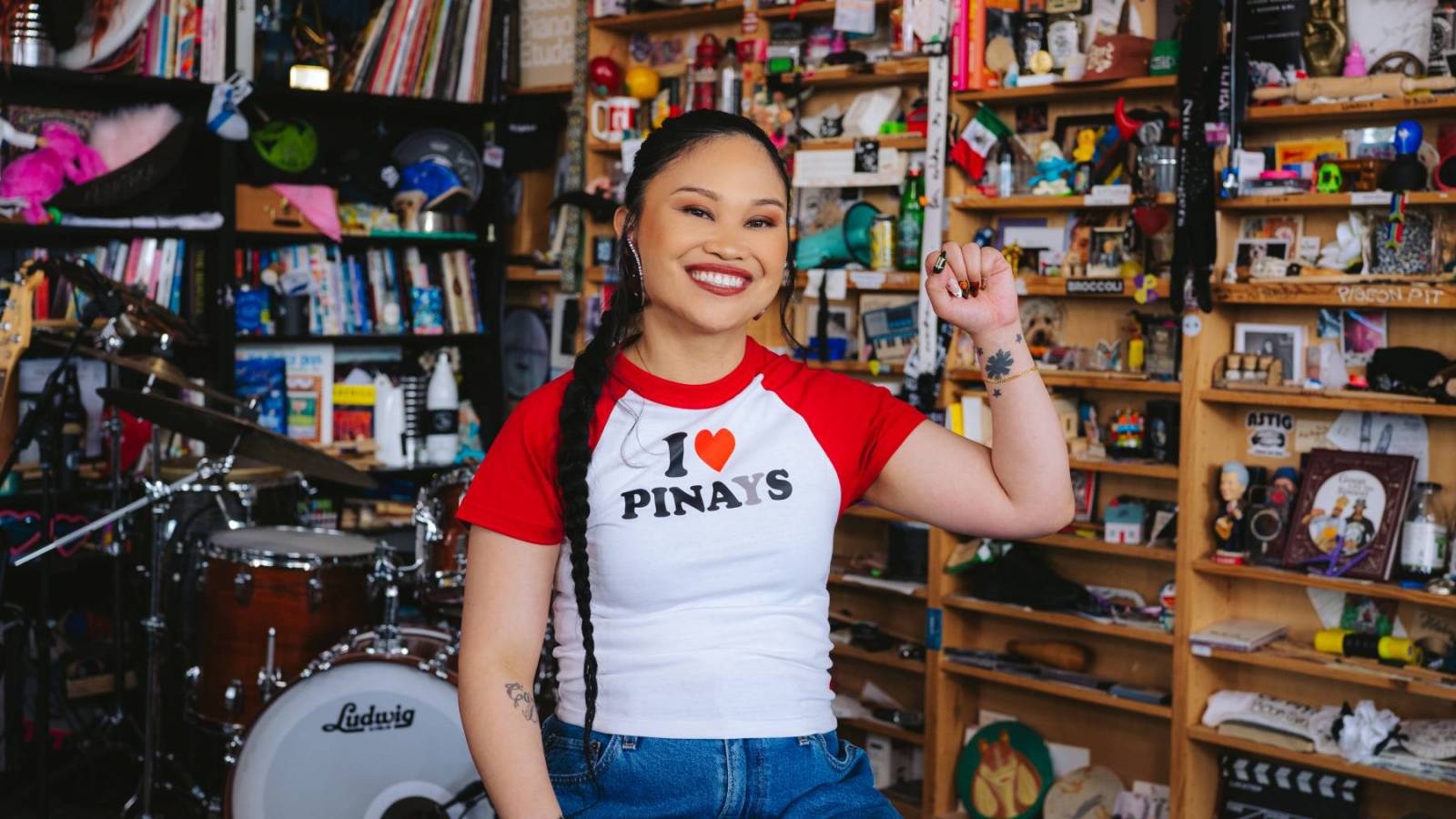
Ruby Ibarra, a Filipina-American rapper from the Bay Area known for her potent storytelling, made her debut on NPR’s Tiny Desk this week.
Chosen among 7,500 entries from independent artists across the country, Ibarra secured the top spot for the series’ annual contest with her entry track, “Bakunawa,” which released last fall. With her hair slicked back into a ponytail and wearing an “I Love Pinays” tee for the moment, Ibarra performed alongside her all-Filipino band and together, they delivered a heavy-hitting trio of tracks buoyed by shimmering instrumentals.
It was a moment Ibarra seized. “Being human is not illegal. Immigrants have been here, lived here, worked here,” she said before introducing herself: “And this immigrant is here. From Tacloban City, Philippines, all the way to Washington, D.C., my name is Ruby Ibarra.”
When speaking to Rolling Stone over the phone, Ibarra, who was born on the Leyte island, recalls her early influences. “A lot of the early memories that I have kept from spending the first few years in the Philippines involved a lot of music,” says the artist. “At a young age, a lot of my cousins, uncles were all part of bands, and they perform at local festivals. So, music was always in and outside of my household.”
After moving to San Lorenzo in San Francisco’s East Bay, Ibarra says she was later influenced by hip-hop’s Golden Age, from the likes of Tupac, the Fugees, and Wu-Tang Clan. Throughout her music, Ibarra weaves in elements of storytelling embracing the rhythms and narratives of the genre, while also bringing her relentless blend of Tagalog and English to her lyrics.
When discussing her choice of tracks for her NPR appearance, along with “Bakunawa,” Ibarra also featured “Someday” (what she says is a “reminder” to herself that some of the best things in life happen in due time) and “7000 Miles,” a song she says felt important to include “because of the state that we’re in right now in this country.”
“There’s a lot of questions about who belongs here, and for me, I’ve always been such a strong advocate, as an immigrant myself, of making sure that people feel seen, people feel visible, people feel like they’re welcome,” she says. “It was a perfect opportunity to create conversation around that and at the same time, to also celebrate my experiences as a Filipina immigrant.”
The single, from her 2017 album Circa 91, portrays her mother’s journey from the U.S. to the Philippines and Ibarra’s own evolving frame of mind while watching her mother struggle and fight for a better life for their family. The rapper says that during her Tiny Desk performance, her mother was in the audience. “Where the chorus goes, ‘Mama will make it in America,’ it was so special,” says Ibarra. While the camera didn’t capture the crowd that included a small group of family and friends, Ibarra says that when she would look over, “they were crying, they were passing around a box of tissue, and I was starting to get soaked up myself just seeing my mom’s reaction, and it was just special.”
She says the moment was an important experience for her and her band, as well as a “collective win.” The ensemble included June Millington of Fanny, Ouida, and Charito Soriano on vocals; Jojo Ramirez on drums; Camille Ramirez on flute and bass; Angelo “Lasi” Macaraeg on acoustic guitar and keyboard; and Anna Macan on electric guitar.
She adds, “We do hope to see more Filipino American artists on that stage, in that space, there’s so much great talent out there, and we’re hoping that we can keep that door open.”
When looking ahead, Ibarra has her efforts focused on her sophomore album that will be released through her Bolo Music Group, which she founded with producer Lasi in 2023.
“I want to make sure that the music that I share always has as a message, has a point. I’m not the type of rapper to ever waste even just the word. Every word is in the song for a reason,” she says. Ibarra says that her music, like her, will continued to evolve, and that the experience of motherhood has made her “revisit a lot of the lyrics that I have.” Passing on the stories of those before her, Ibarra says “I want to continue becoming a songwriter so that the songs I release can help create dialog with my daughter someday.”